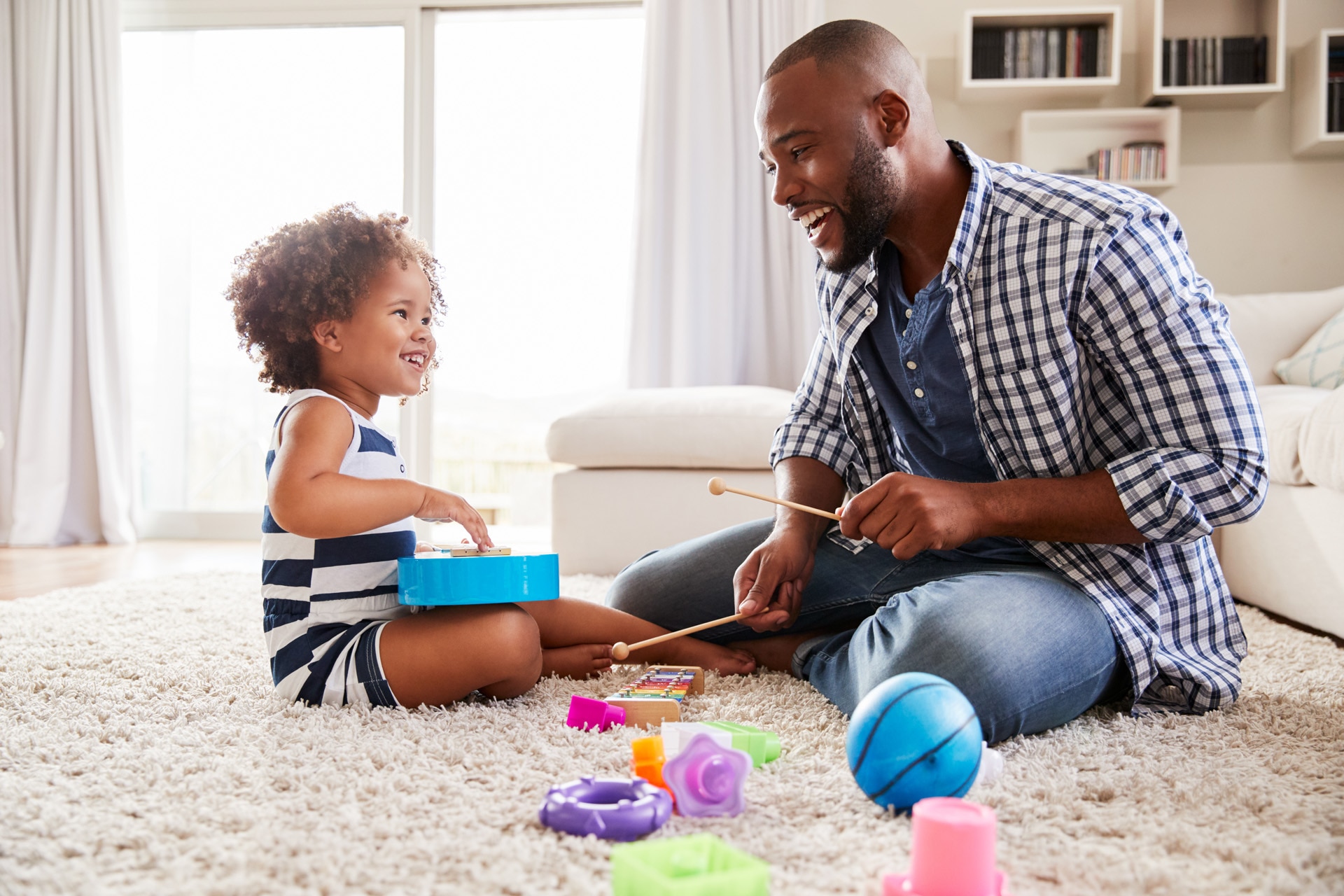These screenings are fast, reliable, painless, and show whether your child’s hearing is or is not at a normal level. If a child fails a hearing screening, they’ll be referred to a hearing care professional for a more detailed assessment.
Children with hearing loss
Educating yourself about children's hearing care needs can help you make the best decisions for your child's future. With fifty years of expertise, we're knowledgeable about pediatric hearing care and work closely with leading hearing care professionals to offer holistic solutions for you and your children.
2-3%
infants per 1,000 births are affected by hearing loss in the U.S.²
The human brain is programmed to learn language during the first six years of life...Without intervention, it becomes increasingly difficult to acquire language as a child grows older.



Children's hearing tests
When your child has a hearing test, it can determine if hearing loss is present, if one or both of their ears are affected, the type of hearing loss they have, their degree of hearing loss, and if their hearing loss can be treated medically or with hearing technology. There are several types of hearing tests and screenings available.
Hearing screenings
Objective hearing tests
These tests are designed to check the responsiveness of the internal structure of the ear with vibrations or air pressure, and do not require your child to respond or participate when they hear a sound.
Behavioral hearing tests
During these tests, an audiologist records how your child hears and responds to sounds across different pitches, plotting them out on a graph.
Hearing solutions for children
While hearing aids are critical to compensate for hearing loss, the best hearing solution for children may be a combination of hearing aids, wireless devices, accessories, and apps.

myPhonak Junior app
The industries only dedicated pediatric app, rated over 4 ⭐- designed to empower children while prioritizing their hearing performance, Remote Support and Remote Control accessible, while Parental Control provides the ability to tailor children’s experiences according to their level of development and independence.


Solutions for children with unilateral hearing loss (UHL)
UHL is a type of hearing loss where hearing in one ear is within normal limits while hearing in the other ear is reduced. The hearing loss in the affected ear can range from mild to profound in severity. It affects up to 6.3% of children in the U.S.³ and children with UHL are five times more likely to need support services.³ A unique combination of solutions is needed to give a child with UHL the best possible hearing experience.
Solution 1: Phonak Sky Lumity
The Phonak Sky™ Lumity hearing aid family is a recommended solution for a child with UHL who has hearing loss on one side that is aidable. Its AutoSense Sky Operating System automatically adapts to children’s everyday listening needs.
Solution 2: Phonak CROS L with Phonak Sky L-PR for children aged 6 years and older, or Audéo L-R/RT for children aged 8 years and older.
For a child with unaidable severe-to-profound hearing loss on one side, the Phonak CROS L microphone can help pick up sound from the side with hearing loss and send the sound to the normal hearing ear wearing a small Sky Lumity hearing aid.
Solution 3: Roger Focus II System
Another solution for a child with an unaidable hearing loss on one side is to use the Roger Focus II system, which—along with a Roger microphone—sends voices directly into a child’s normal hearing ear, providing them with better access to the teacher’s speech in a typical classroom.⁷
UHL Guide for Parents
Teen Musician with UHL
Mason=gain confidence with roger
Roger technology
Roger products can be used in everyday listening situations in conjunction with hearing aids, Cochlear implant speech processor or Roger Focus II, delivering the speaker’s voice directly to your child’s hearing solution. Children can benefit from this technology when they’re listening in noisy environments or when the person talking is at a distance.

At Home
A study showed that when Roger technology is used at home, children are exposed to almost 5,300 more words in an eight-hour day,⁴ compared to wearing hearing aids alone. The same study also showed that while using the Roger system, 80% of families reported greater responsiveness, and 35% reported less frustration in their children.⁴

At School
A Roger for Education system helps your child adapt to modern classrooms that are increasingly dynamic and interactive. It helps them get the clarity of sound they need to participate in activities, respond to questions, socialize with friends, and use multimedia devices.

The importance of communication
By exposing your child to various forms of communication every day, you can help them develop the relationships and skills they need to live a full life that will ultimately positively affect their well-being. Here are some things you can do to help them learn and socialize:
Keep their hearing aids on
Children with well-fit, consistently worn hearing aids have better speech and language outcomes.4
Talk to them often
Children who hear more spoken language in the early years are more prepared for school and language demands as they grow.5
Create a language-rich environment
Expose them to as many words as possible by singing, talking, reading stories, listening to music, and more.
Read out loud
Reading helps children with their vocabulary and helps them learn new concepts and build conversation skills.
Listen to music together
Music assists with early listening skills and develops the hearing centers in a child’s brain responsible for language and learning. It can also improve their ability to listen in noise.

HearingSuccess
A beneficial online portal that gives children and parents access to auditory skills training resources designed to support children’s listening and spoken language development.
Children with hearing loss
Frequently asked questions
There are few different reasons why your child should have their hearing tested:
Your child did not pass their newborn hearing screening or school hearing screening
Your child doesn’t respond to sounds around the home
You, your loved ones, or your child’s teacher has concerns that your child has difficulty hearing or following directions
Your child reports that they have trouble hearing
Your child needs sounds to be louder, like the TV, music, or games
Your child is undergoing ear surgery
Your child is starting medication that could affect their hearing
The status of your child’s hearing can change over time. Some hearing losses are temporary and can be treated medically while other hearing losses are permanent. Further, the severity of some hearing losses can change and either become better or worse while other hearing losses remain stable overtime. Therefore, it is recommended that children with established hearing loss have a hearing test at least once a year to have a current picture of the child’s hearing. If your child is younger or hearing tests have been incomplete, this might require multiple hearing test appointments in a year.
Resources and downloads
Footnotes
* The Bluetooth® word mark and logos are registered trademarks owned by Bluetooth SIG, Inc. and any use of such marks by Sonova AD is under license.
1. Flexer, Carol (2018). The ears are doorways to the brain. Phonak Insight, retrieved from www.phonakpro.com/evidence, accessed February 19th, 2018.
2. Centers for Disease Control and Prevention (CDC). Identifying infants with hearing loss - United States, 1999-2007. MMWR Morb Mortal Wkly Rep. 59(8): 220-223. Vohr B. Overview: infants and children with hearing loss—part I. Ment Retard Dev Disabil Res Rev. 2003;9:62–64
3. Vila PM, Lieu JE. Asymmetric and unilateral hearing loss in children. Cell Tissue Res. 2015 Jul;361(1):271-8. doi: 10.1007/s00441-015-2208-6. Epub 2015 May 26. PMID: 26004144; PMCID: PMC4490007.
4. Benítez-Barrera, CR, Angley G., & Tharpe, A.M. (2018). Remote Microphone System Use at Home: Impact on caregiver talk. Journal of Speech, Language and Hearing Research, Vol. 61, 399-409
5. McCreery, R. W., Walker, E. A., Spratford, M., Bentler, R., Holte, L., Roush, P., & Moeller, M. P. (2015). Longitudinal predictors of aided speech audibility in infants and children. Ear and Hearing, 36 Suppl 1, 24–37.
6. Nelson, J. & Dunn, A. (2021). Roger Focus II in children with Unilateral Hearing Loss. Phonak Field Study News, retrieved from www.phonak.com/evidence, accessed October 2022





